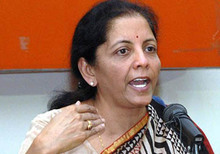
NEW DELHI: India termed the US move to retain it on the 'Priority Watch List' on intellectual property rights (IPRs) concerns as a "unilateral measure" and it is inconsistent with the established norms of the WTO. "India continues to be placed on the Priority Watch List under the US Special 301 on account of USA's assessment of Indian IPR protection being inadequate," Commerce and Industry Minister Nirmala Sitharaman said,

in a written reply to the Lok Sabha. She said the report issued by the US is a "unilateral measure to create pressure on countries to enhance IPR protection beyond the TRIPS (Trade-related aspects of intellectual property rights) agreement".
She said that under the WTO regime, any dispute between two countries needs to be referred to the dispute settlement body of the WTO and "unilateral actions are not tenable under the regime". "Special 301, which is an extra territorial application of the domestic law of a country, is inconsistent with the established norms of the WTO," she added. Countries in this list, according to the US, are not able to protect and properly enforce intellectual property rights.
The US government has always raised concerns on India's IPR policy, saying it discriminates American companies. However, India has maintained that its patent policy is in compliance with global obligations.
Replying to a separate question on cotton exports, the Minister said the textiles ministry has written to Indian High Commissions/Embassies in cotton-deficit countries like Bangladesh, Vietnam, Indonesia, Turkey, Thailand to explore new avenues for export of cotton for stabilising the prices in India.
She said that under the WTO regime, any dispute between two countries needs to be referred to the dispute settlement body of the WTO and "unilateral actions are not tenable under the regime". "Special 301, which is an extra territorial application of the domestic law of a country, is inconsistent with the established norms of the WTO," she added. Countries in this list, according to the US, are not able to protect and properly enforce intellectual property rights.
The US government has always raised concerns on India's IPR policy, saying it discriminates American companies. However, India has maintained that its patent policy is in compliance with global obligations.
Replying to a separate question on cotton exports, the Minister said the textiles ministry has written to Indian High Commissions/Embassies in cotton-deficit countries like Bangladesh, Vietnam, Indonesia, Turkey, Thailand to explore new avenues for export of cotton for stabilising the prices in India.

 RSS Feed
RSS Feed
